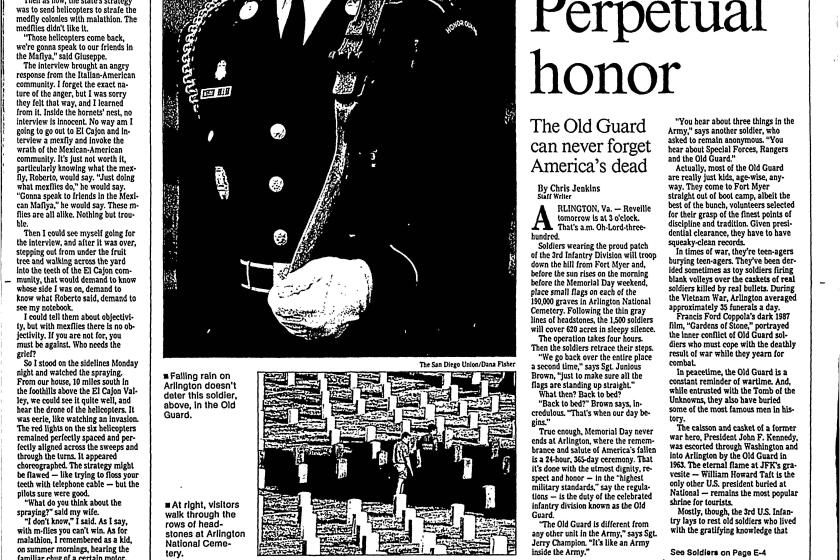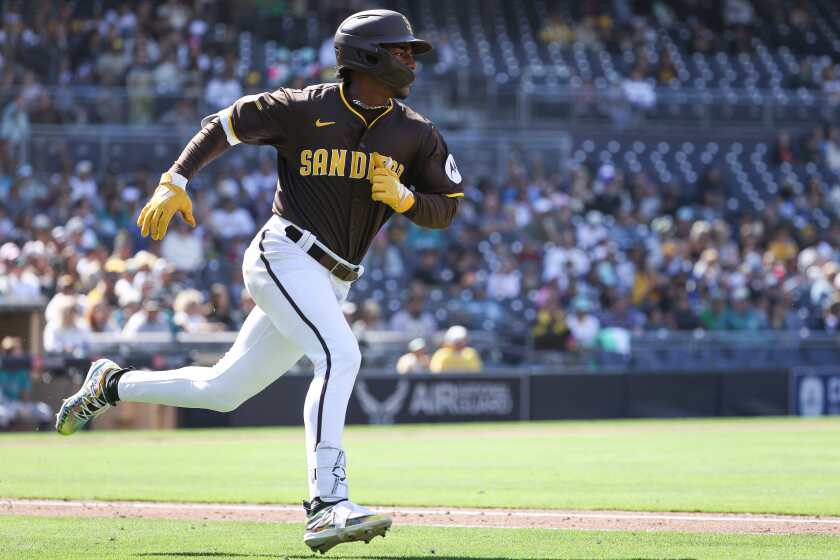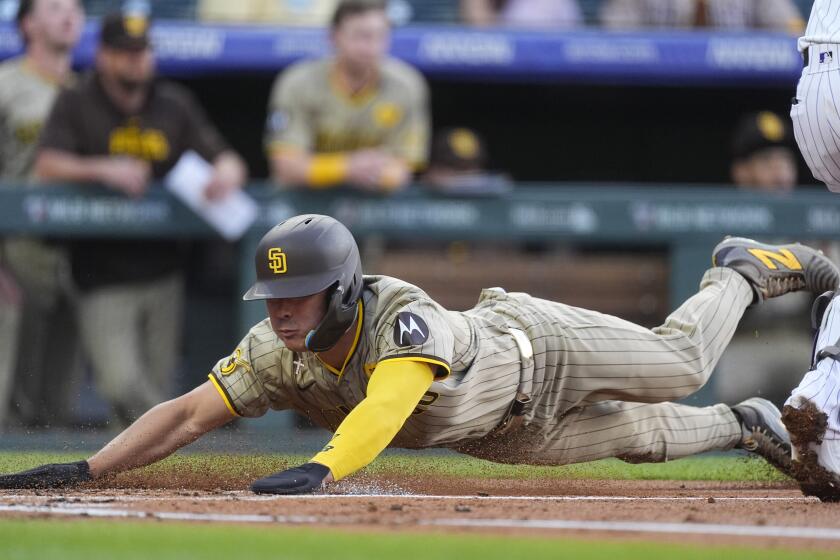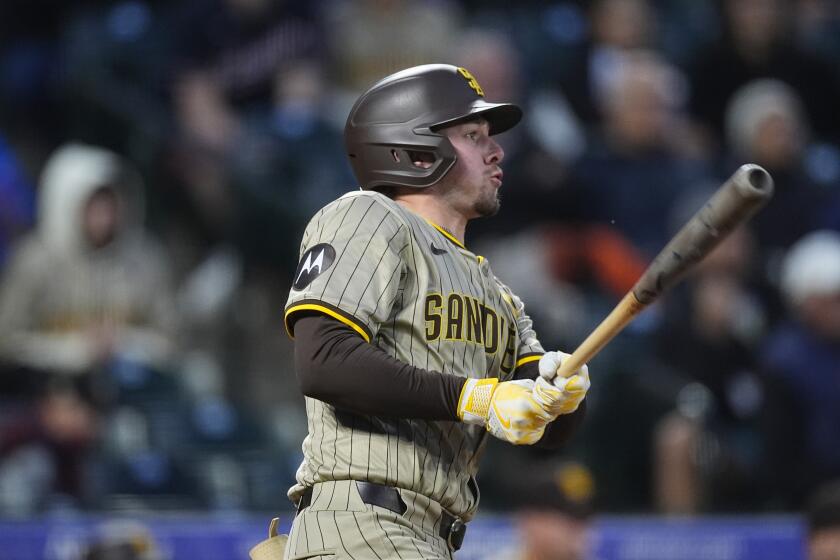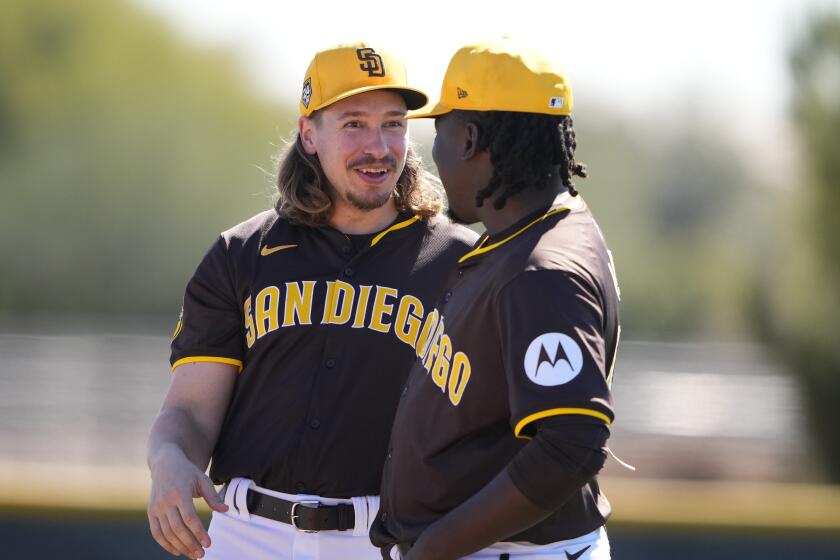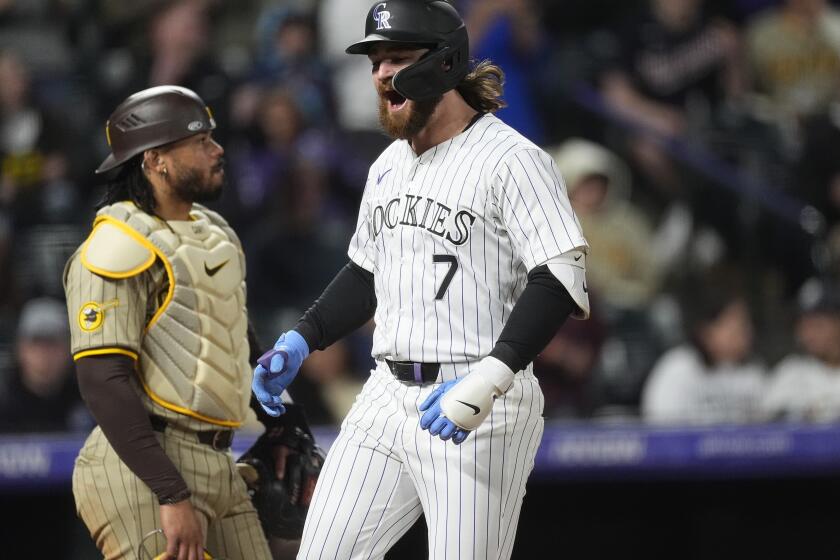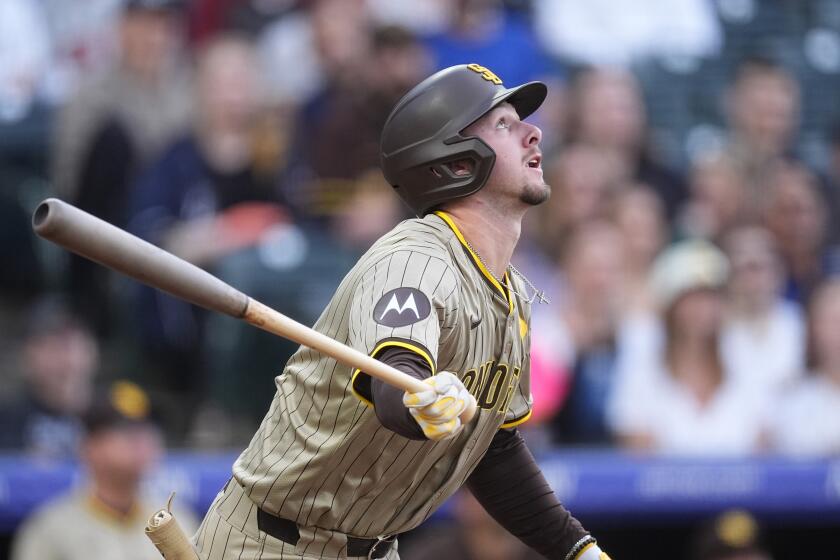Is Padres manager’s job a case of Black and white?
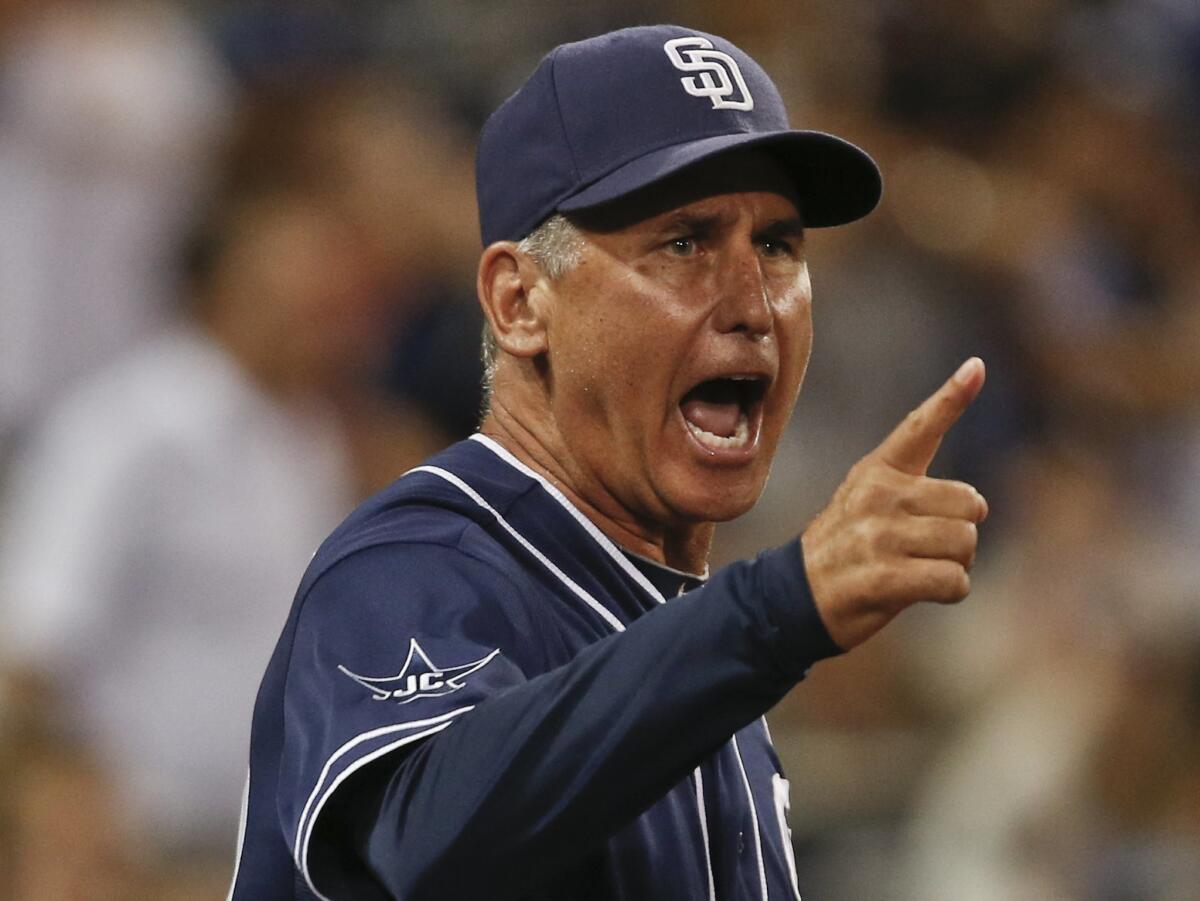
Row 4, Seat 5.
That’s an assigned detail in a story Bud Black likes to tell behind closed doors in spring training, a parable usually saved for the younger players who are newcomers to the Padres clubhouse and the major leagues. He makes the tale applicable and relevant to everyone in his audience, recounting it in the second person, trying to depersonalize it while making it clear that some kinds of pain and anger can linger more than three decades later.
“You’re 24, 25 years old, a rookie knocked out of a game after one and two-thirds innings, and this one guy is crushing you,” says Black. “You’re getting booed hard, but all you hear is that one guy, and he’s getting to you. You get so mad, you pick up the phone to the P.R. department and get the number for the person in charge of season tickets. You call that number and say, “Hey, who’s the guy in Row 4, Seat 5?”
“They actually give you his name. So, now, what are you going to do with it? You know who he is. But by then, you’ve cooled down. And you ask yourself, “What are you doing? Just what do you think you’re going to do? Come on. You’re an idiot! Don’t be an idiot.’ ”
The date was Aug. 31, 1982, the place was Royals Stadium and opponent was the Texas Rangers, a winner by shutout. You’d have to be an idiot, of course, to not know by now that the anonymous “idiot” was Bud Black.
“I remember that moment specifically, and so clearly,” says Black, 57. “For me, that was a defining moment.”
Not really an idiot at all – with hair grown from dark to silver to match the wisdom -- Black uses his own experience as an instructional on the importance of not letting outside detraction and distraction keep a professional baseball man from doing the business of baseball.
Black doesn’t need to be the very smart man that he is, too, to understand that it’s now another one of those times for him to keep doing his job while others wonder how long he’ll be allowed to keep doing his job. At least in San Diego.
Naturally, Black’s fate as manager of the Padres has been a focus of local and national wonder. While it seemed significant that Black was not also fired with general manager Josh Byrnes in the throes of an abysmal first half of the 2014 season, the natural, ensuing question is whether since-hired GM A.J. Preller will decide to begin his regime with a new skipper, even though Black’s contract does runs through 2015.
For whatever it’s worth, Padres president Mike Dee was quoted after Byrnes’ dismissal in early August as having “a lot of confidence” in Black’s leadership, noting that Preller was open to keeping Black when asked in the interview process. Provided that the new GM and incumbent manager were on the same page as far as roster construction, Dee said, he envisioned a solid “marriage” between the two.
For his part, Preller says his relationship with Black is still in the formative stages.
“I’m definitely enjoying getting to know Buddy,” says Preller. “My perception of him, although it was from a faraway perspective, was always a positive one. In the last month or so, having a chance to be around him day-to-day, getting to know his thoughts and getting to know him personally, I can see why his reputation has always been a positive one.”
If there’s no resounding clamor for Black to be dispatched – or kept beyond this season, for that matter – perhaps it’s due to the apathy surrounding a San Diego ball club that’s lost the city with a history of unstable team ownership, non-competitive payrolls, drug cheats and somnambulant baseball.
But maybe it’s also attributable to the fact that people have seen -- and seen more than enough of -- the lineup cards that Black has had to fill out time and again over eight years. For lack of anything better, they’ve been loaded with names of position players who simply can’t hit major league pitching. Home or away.
“With.what he’s been given to work with over his tenure – and I mean this year, too -- I don’t think it fair to put any manager through what he’s had to go through,” says former Padres shortstop David Eckstein. “But you’re seeing the true gift of Buddy: Whatever you give him, he’s the type of guy who’ll see it through.”
Fact is, in terms of longevity and adaptability, Black’s already pulled off a managerial feat of semi-monumental proportion. Preller is the fourth different GM the Padres have had since 2009, and in that span, his clubs have finished just one season (‘10) with a winning record.
Hired by Kevin Towers – who spent 14 years as GM before being cast off by then owner Jeff Moorad – Black also has survived the abbreviated regimes of Jed Hoyer and Byrnes.
Quite remarkably, then, Black is the second-longest tenured manager in the National League. The only one who’s been with his team longer is Bruce Bochy, who left the Padres and took the gig with the San Francisco Giants less than two weeks before Black was named his successor in San Diego. No other active NL skipper took over his current club before 2010.
The only managers with more time with their ballclubs are Mike Scioscia of the Los Angeles Angels of Anaheim (1999), the Minnesota Twins’ Ron Gardenhire (2002) and Tampa Bay Rays’ Joe Maddon (2005), the latter of whom was on Scioscia’s championship-winning staff with Black in Anaheim.
But while Black’s record is well under .500 at 613-676 and doesn’t include an NL West finish higher than second place, all of the aforementioned have winning marks and multiple division titles, not to mention the pennants and World Series rings.
Therein, however, is actually a considerable point in Black’s favor. Two of the last four World Series have been won at the guiding hand of Bochy, whose 1,600-plus wins reflect a career mark only a few games above .500, that owing to the 951-975 ledger from his dozen seasons at the Padres helm.
The Padres’ under-appreciation of Bochy – and their folly of letting him even interview for the vacant San Francisco job in 2006 – comes back to haunt them on the many, many times when Bochy brings his Giants (and their tens of thousands of fans) to Petco Park. Indeed, Bochy could turn out to be like Ozzie Smith or Roberto Alomar, homegrown talents the Padres basically sent elsewhere to become Hall of Famers.
Despite his record with the Padres, too, Black has a reputation that might be stronger outside San Diego. His skills also go well beyond the way he produces and manages some of baseball’s best pitching staffs with coach Darren Balsley.
Indeed, the consensus is that if the Padres do cut ties with Black after this season, he’d jump to the top of candidates for any other managerial openings that arise.
“”He’s extremely well-respected in the game,“ says Hoyer, who left the Padres to become GM of the Chicago Cubs after the 2011 season. “He hasn’t been given a team yet, really, where you could say, “Boy, he really underachieved with that club.’ I think he’s overachieved with a couple teams and had to deal with an inordinate number of injuries there.”
Hoyer didn’t know Bud Black from Walter White when named to replace Towers. And while he said he didn’t come to San Diego with anybody else in mind to be his first managerial hire, he did arrive from Boston’s front office with glowing personal endorsements for Black from both Terry Francona and John Farrell, respectively the former and current Red Sox managers.
“I remember my first meeting with Buddy, telling him I really wanted this to work, told him about the people I knew who’d spoken really highly of him,” says Hoyer, who since has plucked Black’s bench coach (Rick Renteria) to be the Cubs manager. “I thought that if I was to do a search, it would be a search for somebody like Bud Black. He was going into the last year of his deal, but we agreed to hope this (GM-manager relationship) works and play it through.”
Eckstein, who by then was on the back end of a career that included a championship with Anaheim and both a World Series MVP award and ring with the St. Louis Cardinals, became a vital cog in the Padres club that led the majors in wins in mid-August of 2010, ultimately losing a play-in game to miss the playoffs entirely. The Padres came that close with just about the majors’ lowest payroll, an All-Star “reserve” in Adrian Gonzalez and nobody else who hit .300 or more than 13 homers.
“I joke about that (90-72) team, telling people “We were a “B” squad,’ and we were,” says Eckstein. “But Buddy’s done a lot with clubs that weren’t “A” clubs. His role in 2010 was huge.”
Towers, who was GM of the Arizona Diamondbacks until a few weeks ago, has seen Black as both his manager and that of the opposing team for all but one of the last eight years. He recalled the interview process in his need to replace Bochy, hearing Angels owner Arte Moreno tell him that he’d trust Black to run any of his companies or sit on his Board of Directors.
With his countenance, Black is one of the few baseball men who could be a team’s pitching coach, manager, GM or president. Most importantly, Towers said, Black has proven that he has the equanimity and persona to run a 21st century ball club.
“To me, his greatest strength is his people skills,” says Towers. “That’s why he’s revered throughout the industry. He’s known as a manager who knows how to deal with today’s players. Our game hasn’t changed, but the players playing it have changed a lot over the years. I think some of the old-school managers have a hard time dealing with today’s player. Buddy gets it better than anybody.
“Even when times are tough, he’s a great leader. He probably internalizes a lot of stuff. He’s just got a way of keeping people going, getting people to feel good about themselves. You’re never going to see the tough times on his face. You’re not going to see it when he walks into the clubhouse. That’s the sign of a great leader, how they act during the tough times.”
Tough times are most times when it comes to the Padres, especially this season. For a good deal of the summer, they were on pace to set the lowest team batting average and on-base percentage in baseball history, with most of their regulars batting below or barely above the Mendoza Line, yet the Padres maintained their station in the middle of the division standings, if well under a .500 record.
“They pitch it, they catch it, and they’ve got a lot of guys who play hard over there,” Dodgers manager Don Mattingly said of the Padres. “I think Bud does a great job with them.”
With all the injuries to Carlos Quentin and Jedd Gyorko and Everth Cabrera, plus a spinning turnstile of rookie call-ups from the minors, then all the midseason trades that basically has given him a completely different lineup than he began the season with, Black at times has seemed like the guy holding the mallet at a carnival game of Whack-a-Mole.
One thing he is not, however, is an idiot. He knows baseball. As much as he thinks the true measure of a major league manager goes “a little deeper than the won-lost record,” Black also is very matter-of-fact when he often says that his is a “performance-driven game,” and he knows that a new GM might prefer to start with his own guy and a clean slate in 2015.
In the San Diego vernacular, though, Black’s a local. He came here first to play for San Diego State, moved back here early in his major league career and raised a family here, commuting between North County and Anaheim when he was coaching the Angels. His pitching background, but also some serendipity, had a lot to do with his first managerial gig coming in San Diego.
Chances are very, very good that Bud Black will be a major league manager somewhere next year. There’s an adage among baseball skippers that “your second job is usually better than the first,” but Black isn’t eager to find out if that’s his own truism.
“I want to see this happen here,” says Black. “I’ve won World Series as a (Kansas City) player, won a World Series as a coach, and now I want it mostly so that others around me can experience that feeling. I know this city is ready for that. I’m in for the fight, and when it happens, it’s going to be great. Wouldn’t that be great?”
Go deeper inside the Padres
Get our free Padres Daily newsletter, free to your inbox every day of the season.
You may occasionally receive promotional content from the San Diego Union-Tribune.

